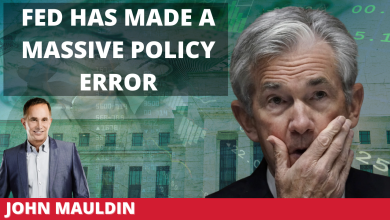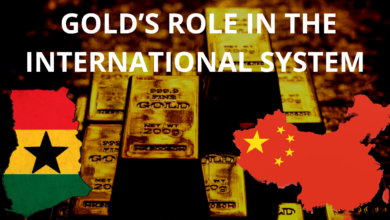Peter Schiff: All Roads Lead to Hard Landing and Higher Inflation

The markets still seem to believe the Federal Reserve can ratchet price inflation back down to 2% while bringing the economy to a relatively soft landing. In his podcast, Peter Schiff throws cold water on this hopeful narrative. He goes through the economic data that came out last week shows that all roads appear to lead to a hard landing and higher inflation.
The stock markets finished up last week thanks to optimism that the Fed will pause rate hikes this summer. Atlanta Fed president Raphael Bostic stoked that optimism when he said he’s in favor of lower — and slower — rate hikes. “Right now I’m still in very firmly in the quarter-point move pacing.” Even though Bostic tempered his comments, saying he will go where that data takes him, Peter said that’s all the markets needed.
The bulls were grasping for straws and this is the one they grabbed.”
We saw big swings from Thursday’s lows to Friday’s highs in all the major stock indices.
Basically, all of the weekly gains were attributable to the Thursday-Friday rally, which was 100 percent the result of Fed-speak about the potential for a pause.”
There was quite a bit of weak economic data last week as well, including a 4.5% drop in durable goods orders. The Dallas Fed Manufacturing Survey came in at -13, below the low end of expectations. The Chicago and Richmond Fed manufacturing surveys were also weaker than expected. Meanwhile, the goods trade deficit was $91.5 billion.
We keep getting number after number that disappoints to the weak side on manufacturing. This flies in the face of a soft landing narrative, because it suggests that if we land at all, it’s not going to be soft. But maybe this is one of the reasons that investors are believing that we’re nearing the end of the rate hike cycle, and we’re going to get a pause followed by a pivot where we get our first cut.”
But Peter emphasized that just because we have a recession doesn’t mean inflation is coming down. In fact, it could be the exact opposite. Regardless, inflation certainly doesn’t appear to be cooling right now based on the productivity and cost numbers for the fourth quarter.
Anybody who is hoping that the Fed is winning the inflation battle, these numbers throw cold water all over that narrative.”
Productivity was down to 1.7% in Q4 from the 3.0% pace in Q3. Meanwhile, unit labor costs surged more than expected by 3.2%.
So, we have lower productivity and higher labor costs. This is not good if you think inflation is under control. The best way to control prices is with increasing productivity. But we’re not getting that. What we’re getting is increasing costs.”
Keep in mind that just because unit labor costs are rising doesn’t mean workers are getting paid more. Unit labor costs also include things like health insurance premiums, payroll taxes and regulations.
In fact, a lot of things the government does to increase labor costs results in fewer people getting hired. Because the government makes it so expensive to hire people that businesses try to avoid hiring where they can. So, they hire fewer people as a result of these rising labor costs.”
Peter reiterated that all of this flies in the face of the notion that inflation is coming under control.
And while there were a couple of better-than-expected economic data points, the rule was weak economic data.
But not only weak economic data, but inflationary data, not just with the weakness in productivity and spiking labor costs, but the fact that all of the manufacturing output is low. We need more supply. Well, we’re not getting it. We’re not producing more. We’re certainly consuming. So, where are we going to get the goods if we’re not producing them? We’re going to import them. That’s what you saw with the merchandise trade deficit. We’re importing the merchandise that we don’t have the industrial capacity to produce, and this is driving up our trade deficit, which will ultimately drive down the value of the dollar and push up domestic consumer prices.”
Peter said most of the optimism about the Fed slowing down its monetary tightening isn’t as much about the economy weakening as it is inflation weakening. But as Peter explained in a previous podcast, once the inflation genie is out of the bottle, it’s impossible to get it back in.
Peter reiterates this point by talking about inflation in the Eurozone.
What the markets still don’t get is even if we end up in a recession — in fact, even if we end up in a financial crisis — the inflation rate is not coming down. In fact, I believe the next recession will be a catalyst to send inflation to new highs. … They still don’t get the reality of stagflation. And they still don’t understand that you can have stronger inflation in a weaker economy. And in fact, this economy is going to be so weak that it’s going to supercharge inflation because the Fed is going to be forced to respond not only to the weakness in the economy, but in particular, the weakness in financial markets and the precarious fiscal position of the US government by unleashing massive inflation — maybe even more than unleashed during the lockdown periods of COVID, and that is going to send the inflation rate to new highs and bond prices to new lows.”
In this podcast, Peter also talks about:
- The fact that the ECB’s inflation goals were asinine.
- The Fed will soon break its money-losing record.
- Debt is going to spiral out of control.
- Big money is leaving crypto.
- Markets don’t get that inflation isn’t coming down.
Call 1-888-GOLD-160 and speak with a Precious Metals Specialist today!
Buka akaun dagangan patuh syariah anda di Weltrade.
Source link






